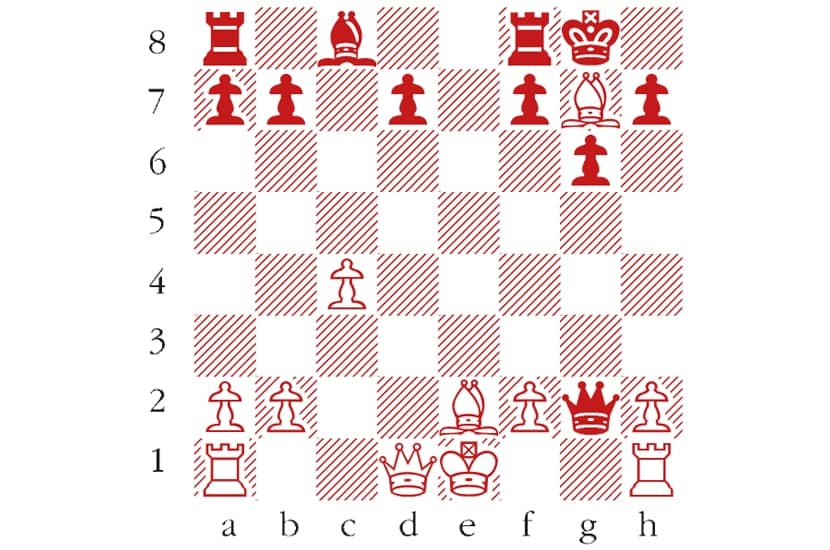Last year’s Netflix mini-series The Queen’s Gambit hit all the right notes. For the neophytes, it was quirky and intriguing. For those already smitten with the game, it was a rare joy to see that chess-wise, they mostly got the details right. Mostly.
One awkward exception was the portrayal of Nona Gaprindashvili, the contemporary women’s World Champion, who held the title from 1962 to 1978. Now 80, she is suing Netflix, claiming false light invasion of privacy and defamation and seeking damages of ‘at least $5 million’.
The point of controversy occurs in the final episode, when the heroine Beth Harmon is playing at an elite tournament in Moscow. The commentator intones: ‘The only unusual thing about her, really, is her sex. And even that’s not unique in Russia. There’s Nona Gaprindashvili, but she’s the female world champion and has never faced men.’
Never faced men? The original novel by Walter Tevis (to which the Netflix script is generally faithful) states no such thing: ‘There was Nona Gaprindashvili, not up to the level of this tournament, but a player who had met all these Russian Grandmasters many times before.’
This is what is written in the court papers: ‘The allegation that Gaprindashvili “has never faced men” is manifestly false, as well as being grossly sexist and belittling. By 1968, the year in which this episode is set, she had competed against at least 59 male chess players (28 of them simultaneously in one game), including at least ten Grandmasters of that time, including Dragoljub Velimirovic, Svetozar Gligoric, Paul Keres, Bojan Kurajica, Boris Spassky, Viswanathan Anand and Mikhail Tal.’
The gist is correct, though if I were suing Netflix, I would be more punctilious with the facts. Paul Keres was indeed a world-class player when Gaprindashvili drew against him at Hastings in 1965. But, for example, Viswanathan Anand wasn’t born until 1969. And one can safely assume that the 28 opponents played simultaneously were cannon-fodder for Gaprindashvili, with no relevance to her professional standing. Post truth indeed, the irony as dense as Dvoretsky’s Endgame Manual.
Last year, Netflix resisted calls to add a disclaimer to state that The Crown was a work of fiction, on the grounds that it was clearly billed as a drama. But the context around The Queen’s Gambit is rather different — almost all the named players are fictional, so the inaccurate description of Gaprindashvili sticks out all the more. She alleges that Netflix acted with actual malice. ‘By advancing the “fairy tale” that only an American woman was on the same level as male Russian chess masters, Netflix enhanced the dramatic impact of its story.’
But never mind the legal niceties — Gaprindashvili can fairly feel affronted. In fact, the implication that Gaprindashvili was Russian is hardly less indelicate. She is Georgian, a country with an extraordinary history in women’s chess, in which Gaprindashvili was a pioneer — in 1978 she was the first woman to be awarded the Grandmaster title. The first three Women’s Olympiads which took place without the Soviet Union, in 1992, 1994 and 1996, were all won by Georgia.
It was serendipitous that last week’s puzzle was taken from one of Gaprindashvili’s games, a brilliancy featuring a double rook sacrifice.
Nona Gaprindashvili — Rudolf Servaty
Dortmund 1974
1 e4 c5 2 Nf3 Nc6 3 d4 cxd4 4 Nxd4 g6 5 c4 Bg7 6 Be3 Nf6 7 Nc3 Ng4 8 Qxg4 Nxd4 9 Qd1 e5 10 Nb5 O-O 11 Be2 Qh4 This tricky tactical idea meets a forceful refutation. 12 Nxd4 exd4 13 Bxd4 Qxe4 14 Bxg7 Qxg2 (see diagram) 14…Kxg7 15 O-O leaves White with a pleasant edge, as the Bc8 is so passive. 15 Qd4! Not 15 Bf3 Re8+
Qxh1+ 16 Kd2 Qxa1 (the position from the puzzle) 17 Qf6 Black resigns






Comments